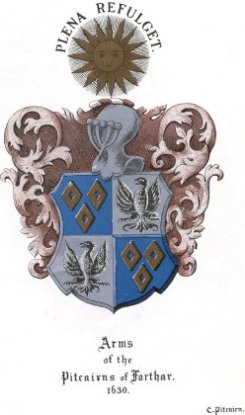|
Notes
John Pitcairn, fourteenth Lord of
Forthar-Ramsay and Pitcairn, succeeded his brother Robert to
Forthar-Ramsay on his death in 1584.
Robert had been uniformly good to him and his sisters: they
were always on the very best of terms.
Robert Pitcairn the Commendator had, long before this, with
the consent of his father David, made John Pitcairn and his
descendants heirs of Forthar-Ramsay and Pitcairn, &c.
The charter was signed at Forthar, 25th January
1551.
John Pitcairn therefore became possessed
of the tenth of the lands of Garbalibus of Inveresk.
He also had Limekilns, Easter and Wester Gellets,
Mistertoun, Rescobie, Weddegang, Coitt, with the mills of
Collerlaw and the Heuch Mills. He had the right, too, to the coals of Gellets.
All this property was around Dunfermline.
The Cartulary of Dunfermline shows this clearly.
In 1584, when the Commendator died, John
Pitcairn succeeded to his estates, which were of great extent, to
the Baronies of Forthar, Downfield, and Pitcairn, many houses at
St Andrews, several lands and manors around Dunfermline and
elsewhere.
The estate of Dovan which belonged to his
niece Janet Balfour was bought back when she died 1589.
Mr John
Pitcairnís life ended in sadness and trouble. Two of his
daughters died before him; his brother the Abbot, although a
devoted servant to his King, had been banished through the
influence of the infamous Arran.
He was eventually pardoned by the King, through the
exertions of Walsingham. He,
however, only returned home to Scotland to die.
His estates were wrested from him, and some of the lands
that he had left by will to his brother John and his nephew Henry,
were forcibly taken from them, through the cupidity of King James
VI to increase his revenues and as a marriage portion for his
Queen. Johnís son
Henry, though duly elected Commendator, was practically obliged to
give up his office and infeft Queen Anne with the lands in 1593.
It is little to be wondered at that, with all this trouble
and anxiety, it should be recorded in the Edinburgh Wills, that on
the 18th Dec. 1593 John Pitcairn died (worn out by a
succession of troubles).
|


